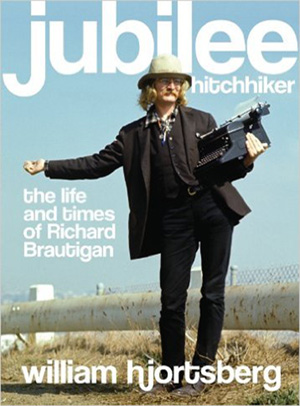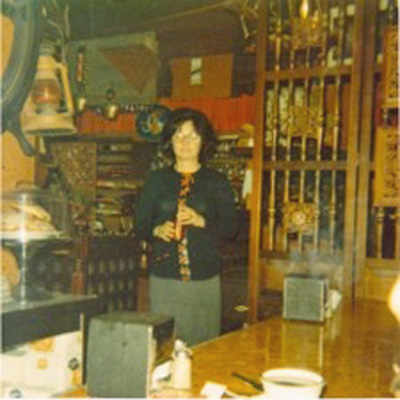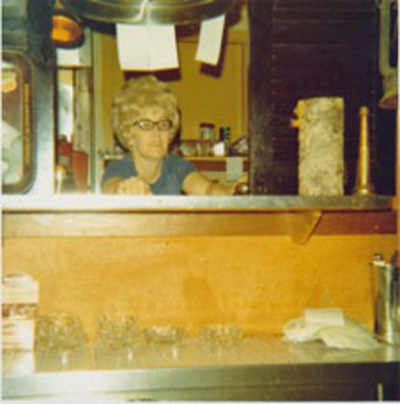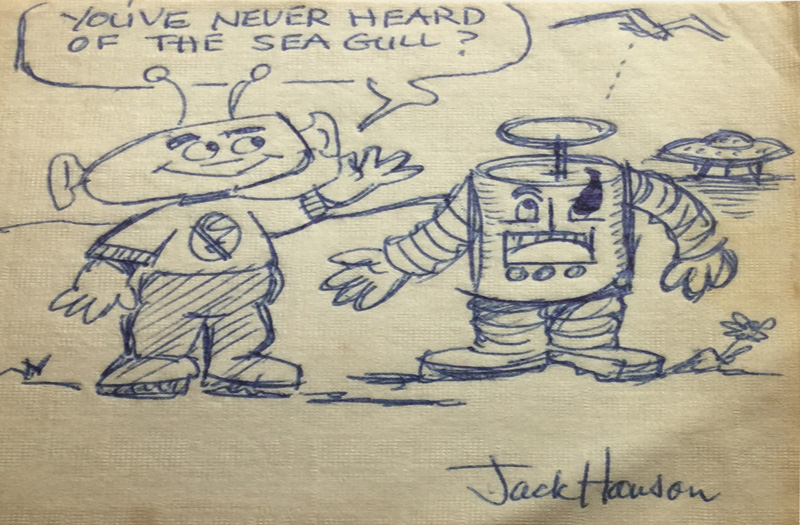One fringe benefit of working in a restaurant is watching the famous people that sometimes arrive unannounced hoping for a bit of normalcy. In my first year at the Sea Gull, I was relaxing at the house next to the restaurant when I got an excited call from the hostess/cashier, Barbara Weber.
“Get over here quick. You won’t believe who’s checking in right now.”
“Who?”
“Richard Brautigan. Hurry, you can take him to his room.”
Little did I know at the time that I would read of this Brautigan trip to Mendocino years later in a long, sad, torturous but fascinating biography of Brautigan by William Hjortsberg.

“All in all, 1973 had been a very good year for Richard Brautigan, ending on a fiscal high note when Helen Brann sent him a check for $45,000 in December, his advance from Simon & Schuster for The Hawkline Monster. In a mood to celebrate, Richard took his daughter and Anne Kuniyuki on a trip up to Mendocino over Christmas. They stayed at the Sea Gull Inn, which provided a pleasant refuge from the cold, foggy weather. Ianthe was sick the whole time, coughing continuously on the drive north. She believed because Anne worked as a professional nurse, she would take care of her. Things didn’t work out that way. Ianthe thought Anne was very nice, “but she was no healer.””
Brautigan with his daughter and friend checked into our most eclectic room, The Barn. The Barn was a ramshackle empty building in the garden between the restaurant and the historic house where the main units were located. The previous owner, Martin Hall, together with his hired carpenter, Claude Drake, converted the rustic, wooden building into a rentable space. You were tempted into the loft sleeping area via an unorthodox and probably illegal ladder that gave the room its country charm. On the ground level there was a smaller bed and lots of space for a family to spread out and enjoy the barnlike atmosphere. There was also a small kitchen.
I admired Brautigan’s writing but was quite shy at the prospect of meeting him. It was more comfortable to converse in the written word where you had time to think and revise what you were saying. I’d read all of his novels and short stories but not all of his poems at the time I met him. In Watermelon Sugar was my favorite Brautigan book. Many years later, Neko Case immortalized the two female characters in her song Margaret and Pauline with its haunting lyrics and twisting story line true to Brautigan’s magical novel.
Barbara was also a Brautigan buff and was so excited about his visit that she insisted on working the next morning so she could see Brautigan again when he came in for breakfast. We changed the schedule to accommodate her. She arrived early the next morning and was dressed for the part, tall black boots to match her hair, a long flowing dress open at the bosom. Not to miss out, or perhaps to protect her, her partner, Jerry Huckaba, accompanied her and sat in the coffee shop.
Jerry was a hulk of a man with a bushy beard, dark and ominous. His brother, Steve, had left town to become a cowboy and was working at a job artificially inseminating cows, the details of which he related to me graphically over lunch on one of his trips back home. Lunch has never been the same since.
The coffee shop was at the entrance to the restaurant and separate from the dining room. It had two counters with stools, a large round table in the center, and two small square tables along the north wall. It was filled with hanging copper pots and advertising signs and funky antiques. It was mostly but not exclusively a local hangout.

On the morning in question two strangers walked in together and sat at the counter. One was short, stocky, and black. He wore dark blue jeans held up by a thick belt with a knife sheath hanging down. He had on a plaid collared shirt. The other was tall, wiry, and white. He had short hair, faded blue jeans and a white t-shirt with a pack of cigarettes rolled up in one sleeve. They seemed okay when they first came in, but the waitress sensed trouble.
“I don’t like them,” she said as I walked by. “They’re rude and demanding, a couple of degenerates if you ask me.”
I told her not to worry, to take their order and tell the kitchen to hurry it up. The coffee shop was filling up and so was the dining room. I didn’t have time to baby-sit a nervous waitress. Breakfast was going to be busy.
Everyone was running around trying to get a job done, sitting customers at their tables, taking orders, hauling out food, bussing tables. The cook was scrambling to keep up with the orders coming into the kitchen.

In the middle of it all, the coffee shop waitress came running to tell me that the two strangers had bolted out the door without paying their bill. I looked out the window and saw them walking across the street to their truck. I rushed outside and confronted them.
“Hey, you didn’t pay for your breakfast, boys.”
They turned and looked at me, their eyes lit up in an evil glow. The short one pulled a knife out of the sheath and crouched down pointing it in my direction.
“You want my money? Come and get it.”
The taller guy pulled out a cigarette from the pack in his sleeve and lit it up with a smirk.
At just that moment, Jerry Huckaba stepped out the front door onto the front deck. He looked like a modern day Paul Bunyan, an angry Paul Bunyan ready to fight.
“You having some trouble, David?”
The short stranger stood up straight but he quickly determined he was no match for this brute on the deck. He put his knife back and reached into his pocket for his wallet. He took out a $20 bill.
“This ought to cover it.”
I took the twenty and stepped back quickly in case he changed his mind.
“Thanks, that’ll do it.”
The two strangers climbed into their truck and sped off.
I turned back to Jerry who was still standing there.
“Wow, thanks. You got me out of a tough spot.”
He gave a little laugh.
“Happy to help. Good thing those dudes didn’t challenge me though. I wouldn’t have been much good. I broke two ribs yesterday and I’m all taped up. I could hardly get out of my chair and through the door with this piercing pain in my side.”
Everyone was looking at us out the window of the coffee shop and laughing. Barbara opened the door to let us back inside.
It was later, after the breakfast rush, when I remembered that Brautigan was around somewhere. I went to the register to speak with Barbara.
“Hey, did you see Brautigan?”
“Nope. The girl and his daughter checked out. They said he’d gone off early to read the tombstone inscriptions at the cemetery. They’re gone.”
“Gee whiz. I’m sorry. I guess you gave up your Sunday morning for nothing.”
“Not really. If I hadn’t come in, Jerry wouldn’t have been here to help you out of that mess. I guess now you can say Richard Brautigan saved your life.”
“Huh. Well, yea, I guess I can.”
I haven’t thought about it much since then but I suppose Richard Brautigan did save my life. Reading his work again, I’m astounded at how he can be funny and sad and crazy and brilliant all in the same sentence. He was a country writer at heart, “a gifted hick” as one reviewer wrote, and this appeals greatly to me along with his lovely pastoral vision, and the “little astonishments going off in your hands” sometimes when you read him as Raymond Carver remarked.
In a wistful article on Brautigan, Justin Taylor writes:
“The smartest thing anyone has ever written about Richard Brautigan, probably the smartest thing that ever will be written about him, appeared first in a San Francisco Sunday Examiner & Chronicle review, and lately reigns as top blurb on the blurb-page of the Houghton Mifflin omnibus editions of his books: ‘There is nothing like Richard Brautigan anywhere. Perhaps, when we are very old, people will write ‘Brautigans,’ just as we now write novels. This man has invented a genre, a whole new shot, a thing needed, delightful, and right.’”
Sometimes I see Richard Brautigan as a disoriented space creature lost on the Mendocino headlands. He’s trying with all his amazing talent to find his way home.
“You’ve never heard of the Sea Gull? Come on, come with me.”


Jerry Huckaba was a true friend and a pussy cat. RIP, Jerry. I miss him.
Jerry’s last name is misspelled. It was Huckaba. ( for the historical record)
Thanks, I think it is fixed this time.
Nice also to be reminded of Steve Huckaba. He was also a big unruly good friend to everybody he didn’t scare or punch.
Love this !